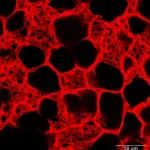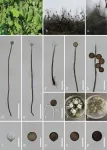(Press-News.org) Microbes are social beings.
Much like humans, they communicate and cooperate with each other to solve problems bigger than themselves. In a microbial community, there will even be free riders, and others that police them.
So, what if researchers could influence their social evolution to promote certain behaviors? Doing so can be vital to solving many of today’s challenges such as combating infection and antibiotic resistance, developing microbial strategies for wastewater treatment or harvesting alternative energy sources.
A research group led by Dervis Can Vural, an associate professor in the Department of Physics and Astronomy at the University of Notre Dame, explored how the social evolution of microbes can be manipulated by tuning the physical parameters of the environment in which they live. The results were recently published in Biophysical Journal.
“Fluid dynamics changes everything,” Vural said. “What we wanted to know was whether we could engineer the social structure of microbial communities. Based on our models, the answer is yes.”
Microorganisms communicate and cooperate using various secretions that are costly to produce, yet provide a benefit to the whole community. These products are called “public goods.” For example, they might secrete digestive enzymes, which then break down the food around them, and this benefits all.
Then there are cheaters. These free riders don’t contribute to the pool of public goods as much, but they still benefit from the contributions of others — and they are a detriment to the system.
“Cheaters care more about their own success than that of the community,” Vural explained. “Since they contribute less to the public goods, they can dedicate more resources to self-reproduction. So, they multiply faster than others and eventually, they will dominate the population. The act of cheating spreads and you see very few microbes actually doing the work — and when nobody does the work, the whole population collapses.”
Through physically and biologically realistic computational models, the researchers set out to understand how to control the interaction structure to “help utilize the full potential of microbial populations,” they wrote in the study.
Fluid flow creates shear forces, a kind of motion that pulls microbial clusters apart and causes them to fragment. “If clusters fragment more often than the rate at which cheating mutants show up, cooperation prevails,” Vural said. “So, by controlling the pattern of flow, we can control the pattern of cooperation.”
Vural’s team looked at multiple means of controlling the evolution of social behavior, including applying different flow patterns through various chambers, funnels, microchannels, filters and chemicals, and in some cases in periodic pulses. Some models were designed to create a vortex, which, through its shear pattern, localized cooperators within a ring while pushing cheaters to the outer rim of the environment — essentially localizing cooperation.
“You can have microbes cooperate within one vicinity but nowhere else,” Vural explained. “You can promote cooperative behavior so there are no cheaters popping up and threatening the population. You can do the opposite — encourage cheaters to kill off a population of microorganisms if desired. And you can do anything in between. You can fine-tune the degree of cooperation.”
Vural’s approach doesn’t attempt to inhibit microbes’ ability to secrete a public good or waste or act as a cheater — instead, it creates an environment that causes the microorganisms to evolve in one way or the other. “We’re not dealing with individuals,” he said. “We’re making a whole population evolve by adjusting the physics in a way that incentivizes them to cheat or cooperate.”
The study is the latest research from Vural on the potential of engineering social evolution in microfluidic environments. “Turning these ideas into experimental reality will be a complex undertaking,” he admitted, saying that it will require a very fine-tuned device fixed with microscopic tubes, filters and flow chambers. But he said the results are very promising and motivate “evolutionary engineering” as a new field of study.
“Our work is typically theoretically driven, but in this case, we were motivated by the very real possibility of engineering social evolution,” Vural said. “Experiments will be complicated but there is huge potential for practical use.”
The simulations were carried out by Vural’s student Gurdip Uppal, now at Harvard Medical School.
Contact: Jessica Sieff, associate director, media relations, 574-631-3933, jsieff@nd.edu
END
Microfluidic environments alter microbe behaviors, opening potential for engineering social evolution
2024-02-06
ELSE PRESS RELEASES FROM THIS DATE:
Structural isomerization of individual molecules using a scanning tunneling microscope probe
2024-02-06
1. An international research team led by NIMS, the Osaka University Graduate School of Science and the Kanazawa University Nano Life Science Institute (WPI-NanoLSI) has succeeded for the first time in controlling the chirality of individual molecules through structural isomerization. The team also succeeded in synthesizing highly reactive diradicals with two unpaired electrons. These achievements were made using a scanning tunneling microscope probe at low temperatures.
2. It is usually quite challenging to control the chirality of individual molecular units and synthesize extremely reactive diradicals in organic chemistry, preventing ...
Moffitt study suggests improvements needed for patient-reported outcome data in genitourinary cancer clinical studies
2024-02-06
TAMPA, Fla. — Patient-reported outcomes are important indicators of how cancer drugs impact patients’ lives. By assessing the benefits and risks of drugs from a patient’s perspective, scientists and physicians can improve the development of patient-centered drugs and care. In a recent study published in eClinicalMedicine, part of The Lancet Discovery Science, Moffitt Cancer Center researchers demonstrate that there is a significant unmet need for improved analyses and reporting of patient-reported outcomes in genitourinary cancer clinical trials.
Health care professionals have realized that how a disease and its treatment ...
New EU-funded project "FOOD includes" aims to improve the inclusiveness and accessibility of adult education
2024-02-06
In December 2023, the new "FOOD includes" project funded by the European Commission started at the Center for Lifelong Learning at Johannes Gutenberg University Mainz (JGU). Over its 36-month term, the objective of "FOOD includes" is to increase take-up and improve the inclusiveness and accessibility of adult education. The project has been designed for adults with lower academic qualifications and migrants who are less likely to take advantage of continuing education and training opportunities. Therefore, the project focuses on activities revolving ...
New water-focused innovation engine aims to turn waste into wealth for Great Lakes region
2024-02-06
The waste in our water could soon generate new waves of clean energy development, job creation and economic growth across the Great Lakes thanks to a new regional innovation and economic development initiative launched by the U.S. National Science Foundation (NSF). The initiative will fund efforts to find new ways to recover clean water, nutrients and materials for clean energy technologies from wastewater — all while removing dangerous chemicals.
These efforts will be carried out by Great Lakes ReNEW, a collaboration of research institutions, universities, ...
Researchers breathe new life into lung repair
2024-02-06
In the human body, the lungs and their vasculature can be likened to a building with an intricate plumbing system. The lungs’ blood vessels are the pipes essential for transporting blood and nutrients for oxygen delivery and carbon dioxide removal. Much like how pipes can get rusty or clogged, disrupting normal water flow, damage from respiratory viruses, like SARS-CoV-2 or influenza, can interfere with this “plumbing system.”
In a recent study, researchers looked at the critical role of vascular ...
Promoting prosocial behavior in the classroom and beyond
2024-02-06
COLUMBIA, Mo. -- Christi Bergin has devoted 40 years of her life to helping teachers and their students. Throughout her career, she’s noticed two simultaneous trends in the field that seem to be connected: a rise in disruptive classroom behavior, and an exodus of teachers from the profession who leave due to stress and burnout.
To help combat these trends, Bergin, a professor emerita in the University of Missouri College of Education and Human Development, has focused her research on improving prosocial behavior — actions that show kindness, compassion, empathy and respect — in classrooms and communities.
Not ...
Perceptions of manhood and masculinities among disabled violently injured Black men in a hospital-based violence intervention program
2024-02-06
Black men with firearm-acquired disabilities face negative physical and psychological impacts on their manhood, independence and mobility, according to a Rutgers Health study.
The study, published in the American Journal of Men’s Health, explored the relationship between Black manhood/masculinities and firearm-acquired disabilities. Participants’ disabilities also impacted their perceptions of independence. Specifically, participants felt that they were a burden to their caretakers because of their reliance on them. This loss of independence ...
Two new freshwater fungi species in China enhance biodiversity knowledge
2024-02-06
Researchers have discovered two new freshwater hyphomycete (mould) species, Acrogenospora alangii and Conioscypha yunnanensis, in southwestern China.
This discovery, detailed in a study published in MycoKeys, marks the addition of these species to the Acrogenospora and Conioscypha genera, further enriching the diversity of freshwater fungi known in the region.
A research team consisting of Lu Li, Hong-Zhi Du and Ratchadawan Cheewangkoon from Chiang Mai University, Thailand, as well as Vinodhini Thiyagaraja and Rungtiwa Phookamsak from Kunming Institute of Botany, China, and Darbhe Jayarama Bhat from King Saud University, Saudi Arabia, employed comprehensive morphological ...
Apex predators not a quick fix for restoring ecosystems, 20-year CSU study finds
2024-02-06
A Colorado State University experiment spanning more than two decades has found that removal of apex predators from an ecosystem can create lasting changes that are not reversed after they return – at least, not for a very long time.
The study, funded by the National Science Foundation and published in Ecological Monographs, challenges the commonly held belief that the reintroduction of wolves to Yellowstone National Park restored an ecosystem degraded by their absence.
Researchers in CSU’s Warner College of Natural Resources ...
Do digital technologies offer a better way to loan people money?
2024-02-06
A new paper in the Quarterly Journal of Economics, published by Oxford University Press, finds that a new form of digital technology—essentially preventing people from using an asset for which they have a loan if they don’t make payments, rather than repossessing the asset itself—may be a better way for lenders to secure loans, particularly for loan recipients in developing countries.
Using collateral to secure debt helps overcome economic frictions, lowering the cost of providing credit. More than 80% of total household debt in the United States is secured by ...




